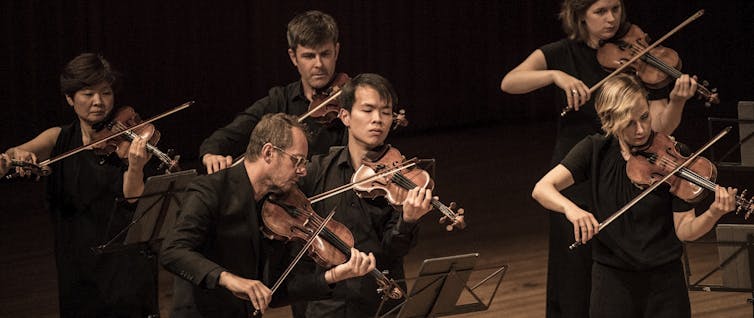Indies & Idols mixes rock stars with modern Polish composers
- Written by David Larkin, Senior Lecturer in Musicology, University of Sydney
Review: Indies & Idols, Australian Chamber Orchestra, Sydney Opera House
“The most heterogeneous ideas are yoked by violence together”: what Samuel Johnson wrote about metaphysical poetry might have seemed transferrable to the Australian Chamber Orchestra’s Indies & Idols program, where 20th-century Polish modernist composers were cheek-by-jowl with contemporary singer-songwriters and rock stars.
And yet, as so often with the ACO’s more eclectic offerings, there were plenty of resonances to be heard across the afternoon. This was less surprising after Artistic Director Richard Tognetti explained that the rock musicians openly acknowledged the influence of the seemingly inaccessible avant-garde.
Surprising though this may seem, the boundaries between popular music and classical music have always been more permeable than such terms suggest. Certain classical works have jumped the imaginary wall supposedly sealing high art off from popular tastes and become culturally ubiquitous: one need only think of the Ode to Joy or Flight of the Bumblebee.
Nor is the idea of the timeless masterpiece unique to classical music. Popular music, too, has undergone its own canonising process, so that the output of the Beatles and Bach are both recognised as “art” transcending their historical moment.
Beyond matters of reception, both sides have benefited from the fructifying influence of the other. Classical music has long mined vernacular music traditions, from folksong importations by Haydn and Beethoven (to name but two) to jazz influences in Debussy and Ravel, while Duke Ellington’s Black, White and Beige and the Beatles’ Revolution 9 show that this stimulus was a two-way street.
Read more: Revolution 50: The Beatles’ White Album remixed
Rarely has a cross-cultural debt been as openly acknowledged as in The National’s Bryce Dessner’s Réponse Lutosławski, a five-movement work written in response to the Polish composer’s Musique funèbre (1958). Although it would have been performable by the ACO’s all-string line-up, the latter work was not heard on this program; instead, Lutosławski’s shorter Overture for Strings opened the concert. This strongly Bartokian work with its quirky pizzicato passages and glissando ornaments crackled with energy.
Even if Dessner’s specific model wasn’t showcased, there were enough textural similarities to enable some kinship to be discerned: col legno (hitting the string with the wood of the bow rather than the hair), siren effects, etc. There was perhaps more expressive lyricism in the Réponse than in the source material, with shimmering textures and fluid figuration prepondering.
 Lutosławski’s shorter Overture for Strings opened the concert.
Nic Walker
Lutosławski’s shorter Overture for Strings opened the concert.
Nic Walker
In terms of performance, the Suite by Sufjan Stevens which closed the first half was particularly outstanding. Stevens’s 2001 electronic album Enjoy your Rabbit was rearranged for string quartet in 2009 as Run Rabbit Run. The Suite utilises four of the five arrangements by Michael Atkinson, reordered into something approaching the expected sequence of movements in a string quartet. Although less overtly Polish-influenced than the other 21st century compositions, it too employed scrub tremolos, slides and knocking on the wood of the instrument.
The opening Year of the Ox established the tonal sound world (later punctuated by noise effects) and good-humoured mood. The highly rhythmical Enjoy your Rabbit equated with a Scherzo, fading out into static at the end. The third movement, Year of Our Lord was a meditative sound-sheet, the slow changes giving it the feel of something static, even architectural. Energy was restored in the final Year of the Boar, with the players clearly enjoying the thrill-ride as much as the audience.
By far the biggest stylistic jolt in the afternoon came at the start of the second half when Penderecki’s Aria was followed by the same composer’s String Quartet No. 1. Written for a film score, the Aria is an exercise in Baroque pastiche, almost indistinguishable from the real thing.
These mellifluous melodies gave way to the seemingly aleatoric landscape of jagged percussive effects and instrumental screams that dominate the uncompromising String Quartet.
Jonny Greenwood’s Suite from There Will be Blood followed without a break. Comparatively friendly in its musical syntax, it had coherence away from its filmic source, now bristling with determination (Future markets), now hypnotic (Prospector’s Quartet), with visually fun elements such as seeing the cellos play in banjo position (Proven Lands).
Tognetti, who since the interval had been directing rather than playing, supplemented the orchestral sound with a few notes on the synthesiser.
In some ways, the best was saved until last with Tognetti’s arrangement of Szymanowski’s String Quartet No. 2. The opening movement plunges the listener into the world of post-impressionist decadence that is the composer’s hallmark, the deliciously aestheticised sound world created through mutes and sul tasto effects (bowing above the fingerboard for a less focused timbre).
The second movement was a frantic waltz above a lively accompaniment, with cleverly varied textures and several nice solos. The impassioned final movement (not Lento throughout, despite what was written in the program book) offered a thrilling conclusion where the players’ commitment was once again palpable.
For the encore there was a return to the output of Jonny Greenwood, this time in the form of Radiohead’s How to disappear completely from Kid A. With Satu Vänskä providing vocals in the original tenor register of Thom Yorke, the swooping, haunting sounds from the much processed original were recreated in analogue form.
This Messiaen-and-Penderecki influenced track thus returned to the classical arena that inspired it: a fitting closing of the circle.
The ACO’s Indies & Idols can be seen in Perth on June 19, Melbourne June 23 and 24 and Sydney June 25, 26, 28 and 29.
Authors: David Larkin, Senior Lecturer in Musicology, University of Sydney



















